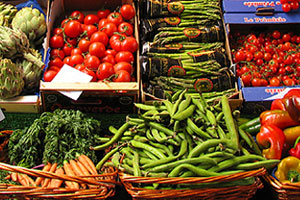
Flickr/<a href="http://www.flickr.com/photos/andrewarchy/">andrewarchy</a>
From the department of no good deed going unpunished, The New York Times reported Sunday that some reusable shopping bags could be contaminating your food with lead. But MoJo reader Barb wrote in with a different health concern about the eco-bags:
“I just got accosted by a man in the grocery store who insisted that my reusable bags were ‘spreading E. coli‘…He seemed to think that I was bringing it into the store and putting people at risk by doing so.”
This piqued my curiosity: Can bags breed bacteria? And if so, how likely is it that shoppers with tainted bags are spreading the bugs around their local markets?
I called Craig Hedberg, a professor in the University of Minnesota’s Division of Environmental Health Sciences. Hedberg told me that the most likely bacteria scenario for reusable bags would likely involve juices leaking from meat, which could, in theory, breed Salmonella or Listeria, or less likely, E. coli or Campylobacter, which could contaminate your veggies on your next trip to the supermarket. “But you have to look at what the likelihood of that is,” says Hedberg. “Probably your meat is going to be in a container, not leaking.” The risk of bacteria that originates on fruits and veggies, he says, is “very low,” as is the risk of a shopper unknowingly spreading bacteria by reaching into a contaminated bag and touching food. “Theoretically this could happen, but it’s not likely.”
That said, you can practically eliminate the risk of bag-borne bacteria by washing your bags after each use. Always wash your produce. Keeping separate bags for meat and produce (like cutting boards) is another good idea. Washing your hands after you go to the grocery store probably wouldn’t hurt, either.
Got a burning eco-quandary? Submit it to econundrums@motherjones.com. Get all your green questions answered by visiting Econundrums on Facebook here.














